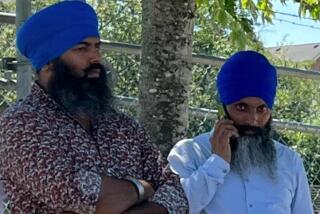Thousands of Sikhs Protest Radicals’ Temple Takeover
- Share via
ANANDPUR SAHIB, India — Thousands of Sikhs, gathered here Sunday to protest the capture of their holiest temple by Sikh extremists, called on the state government to take immediate steps to remove the radicals.
The appeal at the meeting here in the Himalayan foothills of Punjab state sets the stage for a potentially violent confrontation between mainstream Sikhs and the extremists holding the Golden Temple at Amritsar, Sikhism’s most sacred shrine.
“Their bluff has been called,” said a resolution approved at the huge gathering of turbaned and bearded men, many brandishing long curved swords and silver tipped spears. More than 100,000 Sikh men, members of the 15-million-strong faith centered in Punjab state, were transported to the meeting site in buses hired by the state government, which is controlled by the Sikhs’ Akali Dal political party.
Surjit Singh Barnala, Akali Dal leader and chief minister of Punjab, would not say Sunday how his government would move against the extremists holding the temple. “Whatever the time requires,” he said. “This we will decide later.”
Punjab is India’s most prosperous agricultural state, and for five years it has been the site of the country’s most agonizing conflict.
At one level it is a religious conflict sparked by fundamentalists seeking an independent, theocratic Sikh state. On another level, it is a direct challenge to India’s overall unity that has resulted in frequent violence, including the assassination of Indian Prime Minister Indira Gandhi and the killings of more than 2,700 Sikhs in the aftermath of that assassination.
Tensions in the state eased somewhat in June when Prime Minister Rajiv Gandhi reached an agreement with leaders in Akali Dal that led to elections in September, bringing Akali Dal to power in the state.
Since then, however, conditions steadily deteriorated, and on Jan. 26, Sikh extremists, most of them fundamentalist followers of the late Jarnail Singh Bhindranwale, seized control of the Golden Temple complex in Amritsar and dismissed the temple’s five high priests.
Once in control, the extremists also began the demolition of an important building in the temple. The 400-year-old Akal Takht had been severely damaged during an Indian army raid on the Golden Temple in June, 1984, but it was rebuilt by the government. Fundamentalist leader Bhindranwale died in the raid.
The extremists felt that the sanctity of the building was tainted by the government-sponsored reconstruction and could be purified only if it were demolished and rebuilt again from scratch.
As a result, the last three weeks in the Golden Temple complex have been a furious rush of activity as Sikh supporters of the extremists tore down the old structure brick by brick.
The conflict over rebuilding the Akal Takht, the temporal seat of power for the Sikh faith, has led to a bitter division in Sikh ranks, with large numbers of moderate Sikhs virtually excluded from their most cherished shrine.
The majority of the Sikhs, as measured by the huge gathering at Anandpur Sahib, another Sikh holy place, appear to oppose the extremists. One of the resolutions adopted here accused the mostly youthful extremists of “hatching a dangerous conspiracy to bring about a permanent division in the Sikh community by throwing it into civil war.”
Meanwhile, an estimated 30,000 people gathered at the Golden Temple on Sunday to witness the laying of the cornerstone for the new Akal Takht. These supporters of the extremists are mainly Sikhs from rural areas surrounding Amritsar, including most of the poorest Sikh communities. Most of the extremist leaders are members of the All India Sikh Students Federation and its religious ally, the Damdami Taksal.
Most affluent Sikhs and farmers made rich by the decade of uninterrupted prosperity in Punjab, where most of India’s wheat is grown, support the Akali Dal and its religious ally, the Sikh Temple Management Committee.
More to Read
Sign up for Essential California
The most important California stories and recommendations in your inbox every morning.
You may occasionally receive promotional content from the Los Angeles Times.













